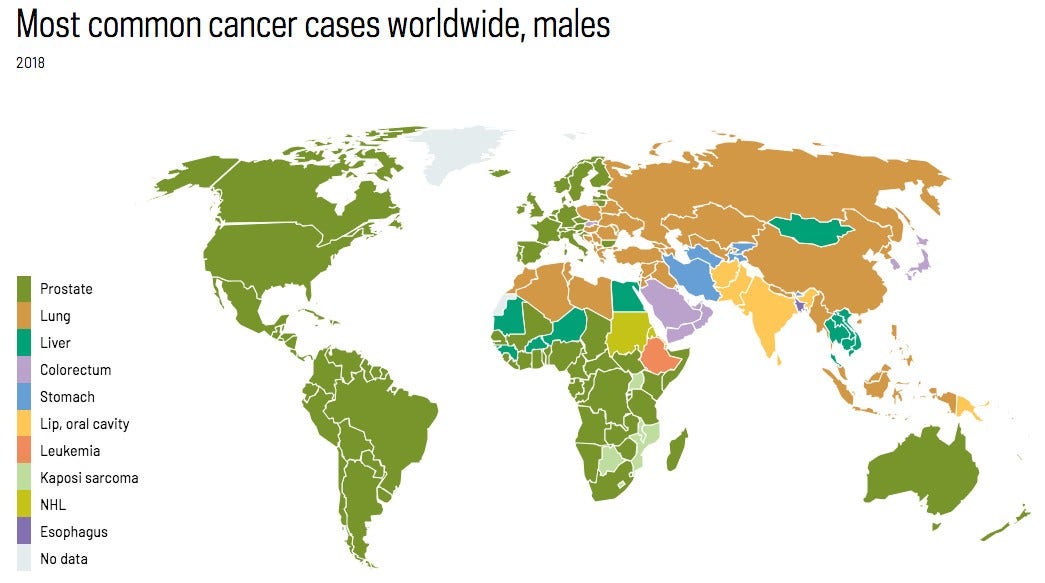The Cancer Atlas, Third Edition, Shows Progress Against Cancer Is Achievable

The American Cancer Society released the third edition of The Cancer Atlas, a comprehensive guide to cancer around the world. Describing the inequities among the global cancer burden, it concludes that progress in the fight against cancer is not only possible, but also achievable.
The interactive site and book feature data from 185 countries to show the global scale and magnitude of cancer, its major causes, prospects for cancer prevention and control, and current inequities.
Maintaining the structure of the previous editions, with chapters grouped into 3 sections: Risk Factors, The Burden, and Taking Action, the theme of the new Cancer Atlas is “Access Creates Progress.”
“Everyone has not benefitted equally from the extraordinary advances in what we know about cancer,” said Gary Reedy, chief executive officer of The American Cancer Society. “Many people living in low- and middle-income countries cannot access the information or interventions that could save their lives from cancer.”
The Cancer Atlas, Third edition, lays out the scale of the global cancer burden and evidence-based solutions that governments, public health agencies, cancer control advocates, cancer researchers, healthcare professionals, as well as patients, survivors, and the general public can use to bring us closer to a world without cancer.
“This much is clear: we simply must do better to ensure everyone can benefit from advances in the fight against cancer,” said Reedy. We have “the proven interventions, dedicated global partners, and momentum we need to truly address the global cancer burden.”
Other examples global problems and evidence-based solutions in the new Cancer Atlas include:
Cancer Deaths from Tobacco
- Global Problem: Tobacco use remains the leading preventable cause of cancer deaths worldwide. Most of the people in the world who smoke—80%—live in low- and middle-income countries.
- Global Solution: Leaders around the world can prioritize and use the tools proven to reduce tobacco use and save millions of lives. Those include taxation, smoke-free air laws, restrictions on product marketing, graphic health warning labels on packaging, and more.
Cervical Cancer
- Global Problem: HPV vaccines can protect against the types of HPV that cause about 90% of all cervical cancers. However, HPV vaccination is isn’t available in all areas, particularly in Africa, where infection rates are highest.
- Global Solution: Widely delivering screening combined with vaccination could avert over 13 million cervical cancer cases by 2069 and eventually lead to cervical cancer eliminated as a major public health problem.
Childhood Cancer
- Global Problem: Today, 5-year survival from childhood cancer in high-income countries is greater than 80%, but it can be as low as 20% in low-income countries.
- Global Solution: With interventions to improve early diagnosis and adherence to appropriate treatment, childhood cancer survival can be increased to 60% in low-income countries, saving almost 1 million children’s lives over 10 years.
There are new chapters on Indigenous populations and universal health care, an expanded section on global cancer survivor statistics, and updated data and graphics since the last edition in 2014.
The Cancer Atlas is produced by the American Cancer Society in partnership with the WHO’s International Agency for Research on Cancer (IARC), and the Union for International Cancer Control. (UICC), with contributions from cancer control experts from around the world. The editors were two American Cancer Society surveillance researchers, Ahmedin Jemal, DVM, PhD, and Lindsey Torre, MSPH, and two IARC researchers, Isabelle Soerjomataram, MD, PhD, and Freddie Bray, MSc, PhD.
The third edition was released on October 16 at the 2019 World Cancer Leaders’ Summit on Cancer and Universal Health Coverage in Nur-Sultan, Kazakhstan.
- Helpful resources
- For researchers




